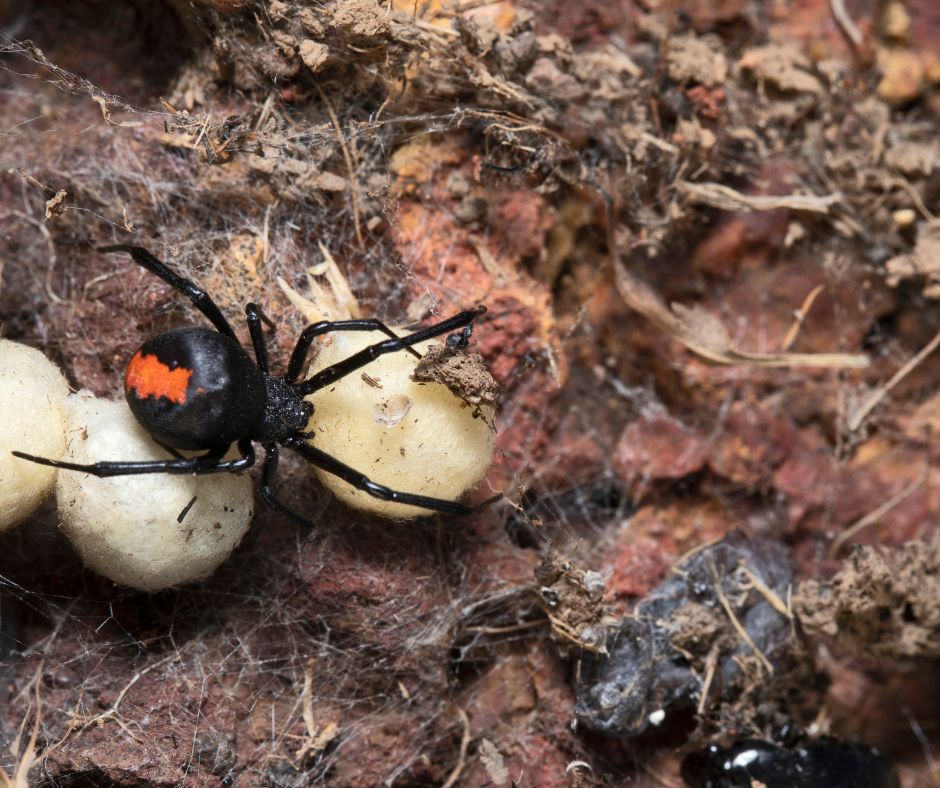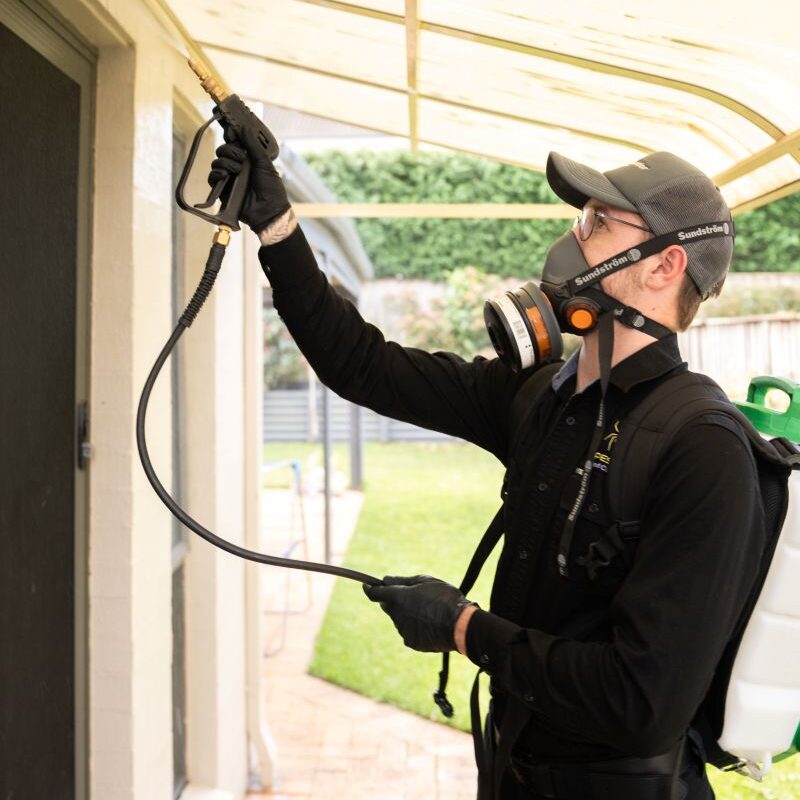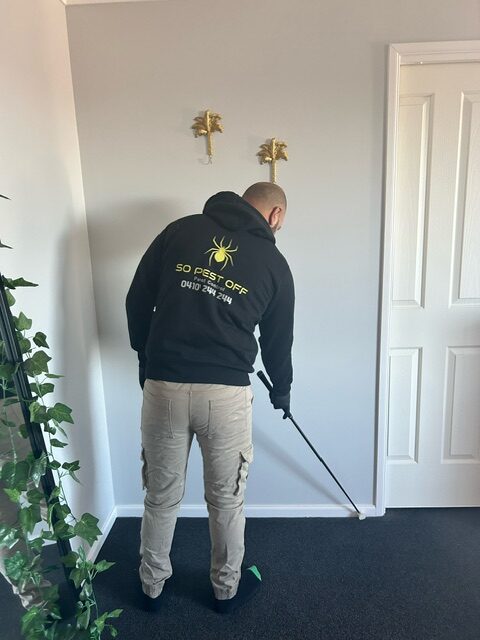
When most people book a pest control service, they expect that every spider in their home will disappear overnight.
The truth? Spiders don’t behave like cockroaches or ants, and that’s exactly why they’re trickier to control.
At So Pest Off, we often get calls from homeowners who’ve had a general pest control treatment and are surprised to see a few spiders still hanging around. This article explains why spider control is different, what you can realistically expect, and how to keep your home spider-free long-term.

Why Spiders Are Harder to Control Than Other Pests
Spiders are some of the most misunderstood pests in Sydney homes. While sprays and barriers work incredibly well for ants, cockroaches, and silverfish, spiders have unique biology and habits that make them tougher opponents.
1. Their Bodies Are Built Differently
Most spiders have thick, hairy exoskeletons that act like armor, preventing insecticides from absorbing easily.
Unlike cockroaches and ants, spiders also don’t groom themselves, meaning they rarely ingest pesticides from treated surfaces.
2. Their Behaviour Limits Exposure
Spiders are active hunters, not scavengers.
They spend less time walking on treated walls or floors, often hiding in gaps, ceilings, garages, and gardens. Since pesticides work through contact, this limited exposure means spiders are less affected once the spray dries.

Common Spider Species in Sydney (and Their Challenges)
Sydney’s warm climate and leafy suburbs make it an ideal environment for many spider species. Here are the most common types we treat — and why each poses a unique challenge:
Huntsman Spiders (including Badge and Tropical Huntsman)
Large, fast-moving, and often found on walls and ceilings. Despite their intimidating size, Huntsman spiders are mostly harmless, but their speed and thick exoskeleton make them difficult to kill on contact.
Wolf Spiders
Ground-dwelling hunters that live in lawns and burrows. They are active at night and resistant to surface sprays due to their dense hair and nocturnal habits. They require soil-targeted or barrier treatments.
Funnel-Web Spiders
One of the most dangerous spiders in Australia. They are burrow-dwellers that rarely cross open, treated surfaces, which makes them less affected by standard sprays and requires targeted treatment by licensed professionals.
Redback and Black House Spiders
Common around sheds, garages, and outdoor furniture. These web-building spiders prefer sheltered, dry environments. Their messy webs are usually the first sign of their presence and pest control is usually effective for these spiders.
Orb-Weaving and Branded Orb Spiders
These harmless garden dwellers build large, symmetrical webs in open spaces. They’re beneficial for insect control but can be unwelcome around doorways, decks, or play areas.
Brown Trapdoor and Eastern Mouse Spiders (including Red-Headed Mouse Spider)
These burrowing species create camouflaged tunnels in gardens and lawns. They’re less affected by sprays and often require soil-targeted or barrier treatments.
White-Tailed Spiders
Commonly found indoors, especially in clothing, bedding, and bathrooms. While their bites can be painful, they don’t cause necrosis as once believed. These active hunters move constantly, meaning sprays only affect them when freshly applied.
How Pest Sprays Work and What They Actually Do
Most insecticides used in Australian pest control are residual sprays, meaning they stay active on surfaces for weeks after application.
They work in three stages:
- Contact: The pest walks across a treated surface.
- Transfer or Ingestion: The pest grooms itself and ingests the chemical.
- Absorption: The pesticide penetrates its exoskeleton, affecting its nervous system.
This process is highly effective for cockroaches, ants, silverfish, and fleas — but less so for spiders, who don’t groom or spend much time on treated areas.
Still, spider treatments do make a difference by:
- Creating barrier protection: any spider crossing treated zones risks exposure.
- Reducing their food supply: fewer insects mean fewer spiders.
- Acting as a deterrent: most spiders avoid areas that smell or feel chemically treated.
Common Misconceptions About Spider Pest Control
We’ve heard them all so let’s clear up the confusion:
- “If I see a spider after a spray, it didn’t work.” Not true. Spiders are less affected by dry residue. The treatment is working by removing their food sources and reducing their population over time.
- “The spray should kill everything instantly.” Modern pest control chemicals are safe for families and pets — meaning they’re slower acting.
- “If I still see one or two spiders, the job failed.” Occasional spiders are normal. The goal is to stop infestations, not remove every single spider.
- “All spiders should die after a general pest control.” Ground spiders (like Wolf or Funnel-web) live in soil or burrows and need specialised treatments.
- “If I don’t see dead spiders, nothing happened.” Many die in hidden areas or outside the home. Success is measured by fewer sightings over time, not visible corpses.
- “Pest control means my home will be spider-free forever.” No pest control can permanently stop spiders from entering. It’s about risk reduction and maintenance — not a one-off miracle.

Best Practices for Keeping Spiders Away
Pest control is one part of the equation, maintenance and prevention make the biggest difference.
Here’s what our experts recommend:
- Schedule regular treatments every six months to keep chemical barriers active.
- Seal entry points, including gaps around windows, vents, and under doors.
- Keep outdoor lights minimal, as lights attract insects — which attract spiders.
- Reduce clutter inside and outside; spiders love quiet, undisturbed corners.
- Sweep away webs regularly so new spiders don’t settle in.
If spider activity increases between visits, your technician may recommend a targeted spider flush or dusting treatment around exterior eaves and wall junctions.
Understanding Realistic Results
Spider control is about management, not magic.
Once pesticide residues dry, spiders are far less affected than crawling insects. But through regular treatments and property maintenance, you can dramatically reduce spider numbers and prevent infestations.
At So Pest Off, we combine advanced pest management techniques with a practical understanding of Sydney’s spider species.
Book Professional Spider Control in Sydney
If spiders are making you uncomfortable at home or work, don’t wait for them to multiply.
So Pest Off offers safe, family-friendly spider pest control throughout Sydney’s Hills District, North Shore, and Western Suburbs.
We’ll inspect your property, identify spider species, and apply the right treatment, ensuring your home stays protected long after we leave.
Call So Pest Off today to schedule a spider inspection and reclaim your peace of mind.
Pest Control Services
Get A Free Quote
Contact us today for a free, no-obligation quote on your pest control needs.





